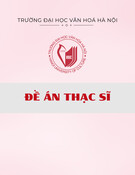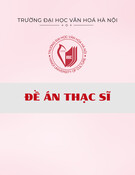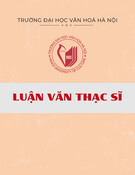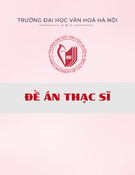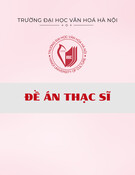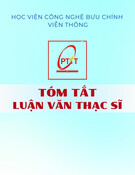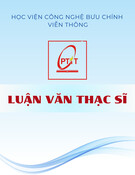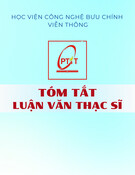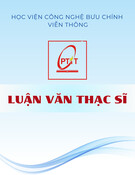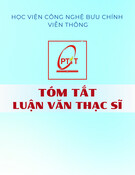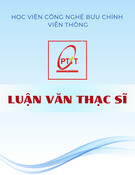VIETNAM ACADEMY OF SOCIAL SCIENCES
GRADUATE ACADEMY OF SOCIAL SCIENCES
TRAN HUNG BINH
PROTECTING LEGITIMATE RIGHTS AND
BENEFITS OF THE JUVENIlE ACCORDING TO CRIMINAL PROCEDURE Legislations OF VIETNAM
Subject
: Criminal Laws
Code
: 62.38.40.01
SUMMARY OF PhD. THESIS OF LAWS
HANOI 2013
THE WORK IS COMPLETED AT THE GRADUATE ACADEMY OF SOCIAL SCIENCES
Supervisor: Prof., Dr., Dao Tri Uc
Judge 1: Ass. Prof. Dr. Tran Dinh Nha
Judge 2: Ass. Prof. Dr. Phung The Vac
Judge 3: Ass. Prof. Dr. Hoang Thi Minh Son
The thesis will be defended by the Thesis Examining Board at
Academy Level, meeting at the Graduate Academy of Social Sciences At....., on ..../..../2014
The thesis can be accessed at the National Library and the Library of
the Graduate Academy of Social Sciences
1
INTRODUCTION
1. The necessity of the thesis
Human rights are an achievement constantly developed by the human being. Human rights consist of nondeprivable rights; the protection of human rights is, therefore, an universal legal assurance.
The legal system in general and the criminal procedure law of any country shall exercise the dual tasks, including both determining the truth of criminal cases that is to make sure the justice is executed and ensuring the right of the parties to be respected, ensured and protected during the path seeking for the truth and justice. The core of the task protecting human rights in criminal procedures is to ensure human rights of the suspect, the accused and the defendant.
The juvenile in general and the children in particular are a special group who have distinguished characteristics, immature psychology and development and are not able to protect themselves when facing legal issues. Thus, there need to be appropriate, sufficient and necessary legal instruments to help them. Concerning the juvenile who get involved in law violations, there has been recently an increase in the number of cases featured with more serious criminal acts committed. There has been an absence of juvenilerelated legislations in Vietnam at the moment as accurately as the meaning of this term. Therefore, this is reflected in reality as commented in Resolution No. 08/NQTW dated on 02/01/2002 of the Politburo, specifically: In general, the judicial work has not met the requirement and expectation of the people. There are a number of cases failing to punish offenders or, otherwise, making innocent people become the victim of injustice, violating the rights of liberty and democracy of the people and negatively affecting the confidence of the people to the Party, the State and the judicial system. This also means the legitimate rights and benefits of the people, possibly including the juvenile, are not really protected.
Due to the above reasons, the research of the thesis “Protecting the legitimate rights and benefits of the juvenile according to the criminal procedure law of Vietnam” may meet the necessity both practically and theoretically.
2. Purpose, task, object and scope of research
2
Purpose of research: the thesis comprehensively, sufficiently and profoundly deals with theoretical issues of the legitimate rights and benefits of the juvenile in the criminal procedures. Results of the research would contribute to improving criminal procedure and criminal legislations and enhancing the awareness of the parties on criminal procedures and the whole society as well in better protecting the legitimate rights and benefits of the juvenile in the criminal procedures.
Tasks: 1) To clarify legislations on the legitimate rights and benefits of the juvenile according to the Vietnamese laws and international laws; 2) To point out obstacles and disadvantages of Vietnam’s criminal procedure legislations in protecting the legitimate rights and benefits of the juvenile as well as shortcomings of the application of such legislations in reality; 3) To suggest recommendations in order to improve applicable laws particular judicial authorities to protect the legitimate rights and benefits of the juvenile.
Object of research: 1) The legitimate rights and benefits of the juvenile who violate the laws; 2) Mechanism to protect the legitimate rights and benefits of the juvenile violating the laws during the different criminal procedure phrases including investigation, prosecution and firstinstant trials.
Scope of research: In term of space, the thesis covers both international legal regimes, including international conventions and agreements and domestic legislation, including perspectives of the Party, the legal system of the State about human rights, the rights of the juvenile, the legitimate rights and benefits of the juvenile in the criminal procedures; the role and task of the criminal procedure legislation on human rights protection; In term of periodic scope: from the date that the criminal procedure code 2003 came into effect (1/7/2004) to the time being.
3. Methodological basics and research methods
Methodological basics of the thesis: Namely, materialistic dialectics, Ho Chi Minh’s thoughts and perspectives of the Communist Party of Vietnam on the humans and human rights; Specifically, the research method that approaches multi and intersectors including multi social sectors utilized as mush as possible. A part from examining human rights of the juvenile in the criminal procedures under legal perspectives, issues that are examined are also put in the connection with other social sciences.
3
The author focuses on analyzing and synthesizing methods, comparative legal sciences and methods of sociology and laws to suggest opinions, solutions that help improve criminal procedure legislations. Also, the author suggests economic, social, cultural and educational solutions to more effectively protect the legitimate rights and benefits of the juvenile in the criminal procedures in Vietnam.
Method of research: In order to obtain objects and tasks suggested, methods of research are, throughout the research, supposed to specifically used in each chapter of the thesis. Namely, the method used in chapter 2 is analyzing and comparing legal documents, contrasting intersectors and examining history related issues. The method used in chapter 3 is synthesizing and analyzing legal documents, listing the protection work of the rights of the juvenile as the party during the resolution of criminal cases. The problem will be analyzed through two groups of party including procedure conducting persons and procedure participating persons. Analyzing and explaining methods will be used in chapter 4 to focus on suggesting solutions in both long and short terms.
4. New scientific contributions of the thesis
Firstly, the thesis will examine and render out a number of definitions about “the legitimate rights and benefits of the juvenile according to Vietnam’s criminal procedure legislation” and “protecting the legitimate rights and benefits of the juvenile according to Vietnam’s criminal procedure legislation”;
Secondly, the thesis will fully and comprehensively assess provisions of the criminal procedure code 2003 and, by doing so, clarify its shortcomings, disadvantages and obstacles concerning the protection of the legitimate rights and benefits of the juvenile as well as their actual implementation;
Thirdly, the thesis will examine and suggest fundamental provisions, institutions of criminal procedures and socialfamily specialized to the juvenile in order to effectively enhance the protection of the legitimate rights and benefits of the juvenile who violates the laws.
5. Theoretical and practical significance of the thesis
Theoretical significance: Results of the research would enrich theories on the rights of the juvenile in general and on the legitimate rights and benefits of the juvenile in the criminal procedures in particular.
4
Practical significance: Contributing to improving the criminal procedure legislation as well as contributing to changing the awareness of the juvenile, the parties in proceedings, families, education institutions and social organizations.
6. Structure of the thesis
Besides the introduction, conclusion, list of references and annex, the thesis
consists of 4 chapters and 12 points.
Chapter 1
1.1. CURRENT RESEARCH ACTIVITIES
AN OVERVIEW ON CURRENT RESEARCH ACTIVITIES
1.1.1. Current research activities in the world
In the field of studying human rights, human rights protection and human rights protection for the juvenile on the globe, the author evaluates a number of international documents and works as follows:
For international documents: The Declaration of human and civil rights (26/8/1789) is the first document to be mentioned, which was publicized by French revolutionists, marking a new development of human rights. The second one is the Universal Declaration of Human Rights (UDHR), which was adopted by the United Nations General Assembly on 10/12/1948 in Palaisde Chaillot, Paris, France. On 16/12/1966 the United Nations adopted the International Covenant on Economic, Social and Cultural Rights (ICESCR) and the International Covenant on Civil and Political Rights (ICCPR).
Besides, the United Nations adopted a number of legal instruments such as the United Nations Standard Minimum Rules for the Administration of Juvenile Justice 1985 (the Beijing Rules), the United Nations Rules for the Protection of Juveniles Deprived of their Liberty 1990, the United Nations Guidelines for Prevention of Juvenile Delinquency 1990 (Riyadh Guidelines), the Declaration on Social and Legal Principles relating to the Protection and Welfare of Children, with Special Reference to Foster Placement and Adoption Nationally and Internationally 1986, the Guidelines for Action on Children in the Criminal Justice System as part of the Economic and Social Council Resolution 1997/30 for Action
5
on Children in the Criminal Justice System (ICCPR, the United Nations General Assembly adopted on 16/12/1996 and took effect from 23/3/1976).
Some outstanding works: "American juvenle Justice" , Franklin E.Jimring,c Oxford University, Publication in 2005; "Juvenile Court: A Judge's Guide for young adults and Their Parents", issued by Leora Krygier, publication by The Scarecrow in 2009…, specially "Handbook for Professionals And Policymakers on Justice Matters Involving Child Victims and Witnessed of Crime", this is one among a series of criminal justice handbooks issued the Office of the High Commissioner for Drug and Crime in 2009.
Through examining foreign works, the author adopts the following advantages: 1) the protection of human rights in criminal justice firstly springs from the relation among human rights, citizen rights and human rights assurances in events occurring during the criminal procedures; 2) a comprehensive approach on the definition of the rights of the juvenile and accessing the definition of legitimate rights and benefits of the juvenile in the criminal procedure under perspective of law studies; 3) fairly describing the current status of international laws on the legitimate rights and benefits of the juvenile.
1.1.2. Current research in Vietnam
During examining documents to study this thesis, the author collects, evaluates and classifies them into three groups according to the above issues, specifically:
Category of works specializing in human rights and human rights protection in general, including the book on “Human Rights a multi and inter sector law studies approach” Prof., Dr. Vo Khanh Vinh as chief author, the social science publishing house, 2010 (three Volumes, 1010 pages), “Human Rights” (Textbook for postgraduate) Prof., Dr. Vo Khanh Vinh as chief author, the social science publishing house, 2011 (487 pages), Monograph Book “Mechanism to ensure and protect human rights” Prof., Dr. Vo Khanh Vinh as chief author, the social science publishing house, 2011 (431 pages).
Category of works specializing in the rights of children including the legitimate rights and benefits of the juvenile, specifically the following works: Protecting the rights of children according to the Vietnamese laws, Hoang The
6
Lien, the Education Publishing House 1996; For the rights of children and for the equality of women, Ho Chi Minh National Political Academy, 2000; The rights of children and the media, the National Political Publishing House, 2000; Enhancing approaching methods based on the rights of children experience and initiatives from Asian countries, the National Political Publishing House, 2006; The rights of children (an indepth book for studies, education and exercise of the rights of children), The Center for Human Rights, 2000.
Category of works specializing in the protection of the legitimate rights
and benefits of the juvenile in the criminal procedures, including the following
outstanding works: Preventing children from committing crime by Vice Dr. Vu
Duc Khien as Editor in Chief, the Law Publishing House, Hanoi, 1987; The issue
of criminal liability of the juvenile according to the Vietnamese criminal
legislation Ph.D. Thesis Dinh Xuan Nam, Kiev, 1994; Justice for the juvenile
and the rights of children Vu Ngoc Binh, the National Political Publishing
House, Hanoi, 1996; Protecting Human Rights according to Vietnam’s criminal
procedures Nguyen Quang Hien, Law Ph.D. Thesis, Institute for State and Law,
2009; Proceedings for the juvenile according to Vietnam’s criminal procedures,
Do Thi Phuong, Law Ph.D. School of Law, Hanoi National University, 2008;
Through examining the above works, the author would make some
comments as follows: 1) works on human rights would play a role as ground for
the author to intensively assess human rights related to the “vulnerable” group of
juvenile, particularly in the criminal procedures; 2) there have been “rooms” in the
research on special group of juvenile, namely there has not been an intensive,
comprehensive, sufficient and systematic research on both theories and actual
legislations as well as application in reality, including issues concerning the
legitimate rights and benefits of the juvenile. In the other words, these works only
approach the rights of the juvenile under perspective of the criminal procedures
1.2. ISSUES NECESSARY TO BE CONTINOUSLY HANDLED IN THE
THESIS
but not under perspective of human rights.
7
Firstly, Interpretations to find out definitions and analyze the nature of the definition of “the legitimate rights and benefits of the juvenile in the criminal procedures in Vietnam”.
Secondly, the issue of protecting the legitimate rights and benefits of the juvenile in the criminal justice (both on the world and Vietnam) needs to be compared, analyzed and interpreted.
Thirdly, the rights of the juvenile and the rights of the mature need to compared to figure out their differences, subsequently finding out “legal empty rooms” remaining.
The forth, the current statute of protecting the legitimate rights and benefits of the juvenile in Vietnam needs to be paid more attention and studied as this is a basis to suggest the solutions;
The fifth, In Vietnam, mechanisms to protect the legitimate rights and benefits of the juvenile in the criminal procedures legislation has not been researched at appropriate level.
1.3. QUESTIONS POSED WHEN DOING RESEARCH
The sixth, solutions to improve the legislation and institution to protect the rights of the juvenile in the criminal procedures must be suitable with the current situation in Vietnam.
For the purpose of approaching human rights of the juvenile in the criminal procedures in order to deepen criminal procedure provisions in terms of both theory and practice, the author needs to clarify the relation among human rights, including the legitimate rights and benefits of the juvenile in the criminal procedures. These relations will subsequently play a role as bridge between the Penal Code, the Criminal Procedures Code and the issue of Human Rights. To handle these two huge issues, there need to be following hypothesis:
The legitimate rights and benefits of the juvenile in the criminal
procedures in Vietnam have not sufficiently and specifically stipulated, and
there have not been enough specialized and effective institutions to best
protect the juvenile’s rights in reality.
From such hypothesis, the author shall examine and systematically answer
the following questions:
1. The definition of the legitimate rights and benefits of the juvenile? the legitimate rights and benefits of the juvenile in the criminal procedures? the legitimate rights and benefits of the juvenile in the criminal procedures in Vietnam? The protection of the legitimate rights and benefits of the juvenile in the criminal procedures in Vietnam in history? The trend of how the legitimate rights and benefits of the juvenile is protected in the criminal procedures in Vietnam and in foreign countries as well?
2. Current statues of protecting the legitimate rights and benefits of the juvenile in different criminal procedures phrases from 2004 up to now, namely: the Vietnamese criminal procedures legislation? The structure of institutions to protect the legitimate rights and benefits of the juvenile in the criminal procedures?
3. Requirements to protect the legitimate rights and benefits of the juvenile in the criminal procedures in Vietnam in the times being and the vision to 2020? Solutions to improve the Vietnamese criminal procedures legislation to effectively protect the legitimate rights and benefits of the juvenile? Solutions to improve institutions in charge of protecting the legitimate rights and benefits of the juvenile in the criminal procedures in Vietnam?
8
At the end of Chapter 1, the author makes the following conclusion: the legitimate rights and benefits of the juvenile in the criminal procedures is one issue that interests various sciences including laws studies in general and studies in the criminal procedures law. This issue is even more pivotal as Vietnam is now heading to a rule of law State “of the people, for the people and by the people”. Therefore, approaching human rights in perspective in the criminal procedures is fairly new one, contributing to improving the criminal procedures legislation as a comprehensive and uniformed solution to protect the legitimate rights and benefits of the juvenile in the criminal procedures.
Chapter 2
THEORIES ON PROTECTING THE LEGITIMATE RIGHTS AND
BENEFITS OF THE JUVENILE IN THE CRIMINAL PROCEDURES
In this Chapter, the author will focus on the following issues:
2.1. DEFINITIONS
9
In this part, the author analyses characteristics of the juvenile as special group of the society, who have specific physical, psychological and personal characteristics and have specific features in term of sociology. The author may summarizes as follows: due to immature development of psychological and physical elements, the juvenile may not have sufficient awareness in education and in social communicationdo. Due to this, the society is required to fairly judge them and extend to them the rights equated with their age. This requires that when the juvenile gets involved in criminal violation, they must be treated consistent with their age, and there must be special institutions to deal with them.
Subsequently, to figure out the definition of the legitimate rights and benefits of the juvenile, the author approaches general analysis on general characteristics of human rights and then point out the relation and objective existence between the universal and specific features of human rights. Accordingly, the universal features only exists as they are reflected in the specific features of human rights. In the other words, the universal features can be seen through the specific features, and the latter only exist as they are linked to the universal features of human rights. Based on analysis on the universal features of human rights, the author focuses on human right related to the juvenile and their legitimate rights and benefits.
In terms of human rights related to the juvenile, the author mainly focuses on two documents as follows: The UN declaration of the rights of the child 1959 and the UN Convention on the rights of the child 1989. Through these two important documents, it is firmly asserted that the children must be protected as they are “physically and intelligently immature and need to be particularly protected, including appropriate legal means before and after they are born”.
In terms of the legitimate rights and benefits of the juvenile, there has been an absence of the official definition on “the legitimate rights and benefits”. These terms are indication of human rights and are provided in the legal system of countries, depending on social, economic conditions and practices of each country. These rights are protected by the laws and different legal institutions. Thus, it is appropriate to mention “the legitimate rights and benefits” in the context of a certain country, and this thesis only examine the topic in the context of Vietnam. The have
10
not been official definition of Children and juvenile; therefore, “the legitimate rights and benefits of the children” is obviously “the legitimate rights and benefits of the juvenile”. However, it is not totally rights as we understand in a opposite way because there is always a “gap” of legal provisions on the group between 16 and 18 years old. Therefore, in Vietnam at the moment, “the legitimate rights and benefits of the juvenile is generally “the legitimate rights and benefits of children”.
Through briefly analyzing the legal system of Vietnam, the author suggest a
definition of “the legitimate rights and benefits of the juvenile”, namely:
The legitimate rights and benefits of the juvenile are peculiar human rights extended to the juvenile, who is physically and mentally immature and vulnerable, and the Sate shall adopt these rights in the constitution and national legal system and ensure them to be implemented in reality as well as protect them when violated.
After suggesting the definition on “the legitimate rights and benefits of the juvenile”, the author focuses on clarifying the term “the protection of the legitimate rights and benefits of the juvenile according to Vietnam’s criminal procedures legislation” in subsection 2.1.3.
To obtain the purpose of the research, the author begin from summarizing mechanism to protect human rights. Namely, the said mechanism may mean the organization and operation of a certain system, which bears two features including system and operation. Accordingly, a system may consist of: 1) legislations and regulations made in accordance with certain competences, procedures and orders and obliged to parties; 2) a structure of authorities established to enforce certain functions and duties. Operation may mean the operation of authorities and organizations to practice their assigned duties.
Next, the author analyzes and emphasizes the role of the criminal procedures legislation as a legal instrument to protect the legitimate rights and benefits of the people in general as well as the juvenile in particular. This is because protecting human rights in the criminal procedures is consider the core matter among all criminal procedures activities. This role is indicated in the Universal Declaration of Human Rights 1948 and the International Covenant on Civil and Political Rights 1966; the Basis Principles for the Treatment of Prisoners, the Convention against Torture and other Cruel, Inhuman or
11
Degrading Treatment or Punishment 1985 … These legal instruments are regarded as standards of human rights in the criminal procedures. Human rights in the criminal procedures consists of the right to a fair trial under a just and open criminal proceeding and court; the inviolable right to live, health, dignity, honor and other rights of private freedom. Any coercive measures applied in the criminal procedures shall be in accordance with the laws; the right to the presumption of innocence; the right to defend, the right not be tried to late; the right to be applied special procedure for the juvenile; the right to appeal, the right to seek justice the right to double jeopardy…
For the special group of juvenile, the protection of their legitimate rights and benefits is stipulated in international documents for the juvenile criminal justice, namely: 1) the Convention on the rights of the child adopted by the United Nations’ General Counsel on 20/11/1989 and came into effect in 2/9/1990; 2) the United Nations Standard Minimum Rules for the Administration of Juvenile Justice 1985 (the Beijing Rules); 3) the United Nations Guidelines for Prevention of Juvenile Delinquency 1990 (Riyadh Guidelines); 4) the United Nations Rules for the Protection of Juveniles Deprived of their Liberty 1990 (the 1990 Rules)…
These legal documents function as guidelines and recommendations to establish a justice system for the juvenile in a country’s legal system. This is not only to respect and protect the rights of the child but also to maintain the social order and safety. Thus, these documents enable countries to make policies for the juvenile criminal justice and domestically legalize and implement provisions of the Convention on the rights of the child concerning the juvenile criminal justice.
In the context of Vietnam, the author briefly introduces the criminal policy of Vietnam to the juvenile crime, which bear profound humanitarian features by the Party and State to the juvenile crime. This is indicated through Vietnam’s criminal procedures legislation, including the Penal Code, the Criminal Procedures Code, one sector legal regulations like Resolutions by the Supreme People’s Court’s Judge Counsel and multisector like Circulars, even other ones which are not legal documents but function as interpretations to
12
apply the laws, such as Annual Reviews by the Court, Letters to direct the application of the laws issues by the Supreme People’s Code…
From examining the relevant international laws and Vietnamese laws, the author render out the definition of the protection of the legitimate rights and benefits of the juvenile in the criminal procedures as follows:
2.2. MEANS TO PROTECT THE LEGITIMATE RIGHTS AND BENEFITS
OF THE JUVENILE ACOORDING TON THE CRIMINAL PROCEDURES
LEGISLATION OF VIETNAM
The protection of the legitimate rights and benefits of the juvenile in the criminal procedures may mean that the State, through providing provisions in the Criminal Procedures Code, shall prevent the juvenile from being violated, depending on ages, levels of development and personal demand to be protected in accordance with the laws where they are a party in the criminal procedures.
In this part, the author, based on Vietnam current statute of the criminal procedures legislation, clarifies the means to protect the legitimate rights and benefits of the juvenile, specifically:
In terms of the criminal procedures legislation, indicated by two aspects:
Firstly, provisions on procedures and orders to deal with a criminal case in various phrases of procedures. In these provisions, there will be a separate chapter stipulating criminal procedures only applied to cases of which the arrestee, the accused or the defendant is the juvenile. However, besides this chapter, other provisions of the criminal procedures legislations shall also be applied to the juvenile.
Secondly, Provisions on the operation (function, duty and power) of the criminal procedures conducting authorities (the investigative agencies, the procuracies, the courts), the law enforcement officers (investigators, the prosecutors, the judges, the jurors, the clerks) and other state agencies and organizations involving in dealing with criminal cases.
In terms of organization of criminal justice system, these are structure and operation of criminal procedures conducting authorities, provisions on obligations to protect the legitimate rights and benefits of the juvenile through the court’s activities of adjudication.
13
2.3. EXPERIENCE OF PROTECTING THE LEGITIMATE RIGHTS
AND BENEFITS OF THE JUVENILE IN THE CRIMINAL PROCEDURES IN
SOME FOREIGN COUNTRIES
Besides the organization of the criminal justice system, the legitimate rights and benefits of the juvenile are also protected through other family and social institutions, namely the participation of agencies, organization, families in handling criminal cases of which the accused and the defendant are the juvenile.
2.3.1. Overview on a number of means to protect the juvenile in the
criminal procedures in the world
In this part, the author examines some models to protect the juvenile in the criminal procedures in the world both in the past and currently. These models is selected to be examined based on their aspects representing different legal model. The models chosen to be examined are the Philippines, New Zealand, New South Wales, Japan, Scotland, the Czech Republic and the United States.
Comments: Through examining these legal models, the author finds that, in order to protect the legitimate rights and benefits of the juvenile, apart from improving specialized legislations, a specialized justice system is fairly crucial, including a model of specialized courts as an.
2.3.2. Some models of specialized court in the world
Models of specialized court in the world can be the juvenile specialty court (welfare model), justice model for the juvenile (punishment model) and model of family courts. Through examining these models, the author makes the following comments: a model of combined family court can be, in different aspects, regarded as a ideal justice system. This is a comprehensive approach to handle families’ problems to maintain a healthy life and welfare to every member of a family.
At the end of chapter 2, the author makes the following conclusion: in order to protect the legitimate rights and benefits of the juvenile in the criminal procedures, countries in the world have implemented various approaches, such as making specialized legal provisions as part of legal policies, establishing specialized institutions and other relevant institutions.
14
Facing increasing demands during the international integration, Vietnam has made huge efforts to keep up with other countries by domestically legalizing international laws to establish means to protect the legitimate rights and benefits of the juvenile in the criminal procedures. However, Vietnam is still facing challenges and obstacles and new approaches need to be examined to better protect such group of people.
Chapter 3
CURRENT STATUS OF PROTECTING THE LEGITIMATE RIGHTS
AND BENEFITS OF THE JUVENILE ACCIRDING TO THE
CRIMINAL PROCEDURES LEGISLATION OF VIETNAM
3.1. PROVISIONS OF CRIMINAL PROCEDURES LEGISLATION AND
THEIR ACTUAL APPLICATIONS IN PROTECTING THE LEGITIMATE
RIGHTS AND BENEFITS OF THE JUVENILE
In this Chapter, the author examines and evaluates current status of means to protect the legitimate rights and benefits of the juvenile according to the criminal procedures legislation of Vietnam, namely: 1) Provisions and their actual application of the criminal procedures legislation; 2) current status of organization and operation of the procedures conducting authorities; 3) current status of protect the legitimate rights and benefits of the juvenile in the criminal procedures from families and social organizations. The author utilizes methods such as contrasting relevant provisions, international recommendations in protecting the legitimate rights and benefits of the juvenile (as clarified in Chapter 2 of the thesis), analyzing provisions in the criminal procedures code to point out “legal gap”, shortcomings and suggesting their reasons in order to give out a number of solutions and recommendations in Chapter 4. Namely:
In this part, the author focuses on evaluating shortcomings and obstacles concerning provisions in the criminal procedures legislation in protecting the legitimate rights and benefits of the juvenile as well as their application in reality, namely difficulties in applying provisions on matters necessary to be proved (Article 302 of the criminal procedures code); shortcomings
15
in arresting procedures (in urgent cases and caught redhanded), and temporary detention and termdetention against the juvenile. By analyzing shortcomings of these preventive measures, the author points out the cause of “abuses” of preventive measures against the juvenile, namely: 1) current status of administrating criminal records and forensic situation; 2) lack of provisions on standby measures which can apply to the juvenile offenders where coercive measures are not applied against them; lack of sanctions applied to the person who fails to supervise the juvenile offender.
Besides, the author also pays attention to clarifying other effective
measures to protect the legitimate rights and benefits of the juvenile offender,
such as the role of the defend counsel and legal aids. Subsequently, the cause of
shortcomings and difficulties have been pointed out, namely 1) the relevant
provisions in the criminal procedures code may not be an efficient mechanism,
and therefore these provisions is difficult to implemented, if not implemented in
reality; 2) difficulties from the counsel (capability and responsibility); 3) lack of
3.2. CURRENT STATUS OF ORGANIZATION AND OPERATION OF
PROCEDURES CONDUCTING AGENCIES IN HANDLING CRIMINAL
CASES RELATED TO THE JUVENILE
awareness of the juvenile and their family.
This part introduces findings of the thesis. The author, through analyzing
the performances of the procedures conducting agencies as well as procedures
conducting officials to clarify current status of the justice institutions as one of
tools protecting the juvenile in the criminal procedures. The following causes can
be blamed for shortcoming and obstacles of authorities in the justice system:
Firstly, the awareness of the protection of the legitimate rights and benefits of the juvenile in the criminal procedures has been fairly limited: 1) In terms of the procedures conducting agencies (lack of specific interpretations,
issuing poor and improper regulations to protect the legitimate rights and
benefits of the juvenile); 2) In terms of the procedures conducting officials
(failing to ensure the right to defend counsel for the juvenile, failing to explain
the rights and duties of the juvenile during interviewing them and their family;
16
failing to prepare for interviewing with the juvenile, even showing improper
manners against them).
Secondly, the capacity of procedures conducting officials who handle
cases related to the juvenile has remained limited, not meeting practical
requirements. Specifically: 1) the investigator and prosecutor have not had
enough knowledge of treating juvenile offenders the during the investigation
stage; 2) during pending trials or at trials, there has been a lack of specialized
judges handling juvenile cases. Explaining and sentencing activities also pose
some problems concerning the capacity of the judge. Besides, the capacity of
the juror can be a problem concerned. Finally, the trying chamber has
sometimes failed to summon relatives of the juvenile defendant.
Thirdly, facilities to assist in handling juvenile cases have not been paid
enough attention as expected, specifically: 1) the juvenile offenders are often
interviewed at the office of the investigative agency. This may raise tense and
uncomfortable atmosphere against them and may not ensure the rights of the
accused to be properly exercised, negatively affecting the investigative
activities; 2) During trials, the form in which trials are underway seems to be
inappropriate, not meeting “the right to enjoy a private trial” as recommended
by the international community. The fact is that juvenile trials are not taken
place behind the door closed. In some localities, the trials are even taken place
publicly as the so called “mobile trials”. Also, the facts related to juvenile cases
are somehow available to the media.
These problems obviously worsen the juvenile offenders and their
families as well. This can lead to a prejudice or discrimination against them in
3.3.
CURRENT STATUS OF PROTECTING THE LEGITIMATE
RIGHTS AND BENEFITS OF THE JUVENILE UNDER PERSPECTIVE OF
THE FAMILY AND SOCIETY
the community, which can negatively affect the concerned juvenile’s future.
The Criminal Procedures Code has a number of provisions indicating the
role of the family and society in criminal procedures activities. Not mentioning
group of the disable, who account for a very small group possibly getting
17
involving in the criminal procedures, the legitimate rights and benefits of the
juvenile is clearly subject to these provisions.
The provisions on the role of the family, the school and other social organizations as parties in the procedures are rather obscure; therefore, the application of these provisions has remained ineffective, specifically: 1) information of the arrest against the juvenile offenders is not available to the their family’s representative in order to supervise them; 2) representatives of the family or the school are not summoned to juvenile trials. Furthermore, the obligation of officers from relevant state agencies organizations to take part in the jury is not legally clear, particularly who specialize in taking care and protecting the juvenile (such as The committee for protecting and taking care of the children).
At the end of Chapter 3, the author makes the following conclusion: examining shortcomings and obstacles and finding out causes of the ineffectiveness of measures are a ground to suggest a number of solutions to protect the legitimate rights and benefits of the juvenile in the criminal procedures, which is expected to close the gap between the domestic laws and the international laws.
Chapter 4
SOLUTIONS TO EFFECTIVELY PROTECT THE LEGITIMATE
RIGHTS AND BENEFITS OF THE JUVENILE ACCORDING TO THE
4.1. INTERNATIONAL TREND AND OPINIONS OF THE PARTY AND
THE STATE OF VIETNAM ON THE ISSUE OF PROTECTING THE
LEGITIMATE RIGHTS AND BENEFITS OF THE JUVENILE ACCORDING
TO THE CRIMINAL PROCEDURES
CRIMINAL PROCEDURES LEGISLATION OF VIETNAM
In this section, the author analyzes and comments on the global trend in policies concerning protecting children as well as the opinion of the Party and State of Vietnam on the issue of protecting the legitimate rights and benefits of
18
the juvenile in the criminal procedures, particularly opinions on amending the current criminal procedures code according to the judicial reform.
In terms of the global trend: There has been a profound understanding of the development of the children, the juvenile as well as further understanding of the behavior of children suffered by their psychology damaged. Also, there has been a trend in changing judicial model in which welfare and punishing models turn into recovery model; the trend in which the traditional justice system may, as far as possible, no longer deals with the juvenile crime; the trend in enhancing the aid of the community to the children and their family; the trend in supporting families.
Direction to amend the Criminal Procedures Code, the amendment must stick to five principles, including: 1) thoroughly following and legalizing the
resolutions of the Party on strategy of judicial reform, which is to meet
requirements to fight against crimes in the process of development; 2) focusing
on the most challenges and difficulties arising from the Criminal Procedures
Code under the spirit of judicial reform; 3) strongly reforming the procedures
under the spirit of democracy, open, transparency, coherence, convenience,
ensuring the role and supervision of the people over judicial activities; 4) better
maintaining the right of freedom, democracy of the people, human rights and the
rights of the child, which are stipulated in the constitution, the domestic laws as
well as international agreements and rules to which Vietnam is the party; 5)
reviewing difficulties and obstacles arising from the investigation, prosecution
and adjudication work in practice, combining adopting legal tradition and
4.2. CATEGORIES OF SOLUTIONS TO EFFECTIVELY PROTECT
THE LEGITIMATE RIGHTS AND BENEFITS OF THE JUVENILE
ACCORDING TO THE CRIMINAL PROCEDURES LEGISLATION OF
VIETNAM
experience of other countries concerning the criminal procedures laws.
4.2.1. Category of solutions to enhance legislations
The author supposes that the introduction of a separate law on the
juvenile justice would ensure standards in the international community to be
19
legalized. However, it is not easy to establish such separate law. In some civil
law countries, the legislation on the juvenile justice is only a chapter in the
criminal law. Thus, instead of introducing a separate law on the juvenile justice,
it is reasonable to stipulate provisions featuring basis principles among the
general provisions on the resolution of cases in which the juvenile is a party
which play as fundamental principles to fix specific provisions during different
phrases of the cases. Along with this, improving chapter 10 of the penal code
and chapter 32 of the criminal procedures code is sufficient and feasible for the
implementation as well as meeting international standards.
Direction to amend chapter 32, firstly there should be a specialized and
peculiar procedures for juvenile cases. Accordingly, scope of application,
includes the juvenile offender or the juvenile as other parties like the victim,
the witness.
Concerning specialized and peculiar procedures, the amendment will be
in three content, equivalent to three Parts, including: 1) General principles on
dealing with cases in which the juvenile is a party; 2) provisions on the
procedures only for the juvenile offender; 3) provisions on the procedures only
for the juvenile who is the witness and the victim in the case.
In further details, the author proposes a direction to improve provisions
on investigation, prosecution and adjudication of the juvenile offender in the
criminal procedures code, accordingly:
4.2.1.1. Supplementing principle provisions
To interpret the thought that “the best interests of the children must be
taken into consideration”, the author proposes to add to Part I General
provisions, chapter II Fundamental principles of the Criminal Procedures
Code a new article which stipulates a principle governing the investigation,
prosecution and adjudication against the juvenile. This new article is based on
Circular No. 01/2011/TTLTVKSTCTANDTCBCABTPBLĐTBXHĐ by
the Supreme People’s Procuracy, the Supreme People’s Court, the Ministry of
Public Security and the Ministry of Labor, Invalid and Social Matters, dated on
20
12/7/2011. Based on this fundamental principle, certain provisions would be
improved in order to protect the rights of the juvenile.
4.2.1.2. Amending provisions on investigation, prosecution and
adjudication of the juvenile
To tackle shortcomings and obstacles existing from the application of
the current criminal procedures code in relation to procedures applied for the
juvenile offender, which is to meet demand of protecting the legitimate rights
and benefits of the juvenile offender in criminal proceedings and stick to
polices by the Party and the State on the fight against juvenile crime, the
author proposes a number of approaches to improve provisions on
investigation, prosecution and adjudication of the juvenile offender in the
criminal procedures code, specifically:
Firstly, amending Article 301 of the Criminal Procedures Code, which
provides for scope of application of provisions in Chapter XXXIII on
procedures applied for the juvenile; accordingly, the convicted is added, and the
specialized procedures are also applied to the offender who is 18 years old, but
under 18 at the time committing crime.
Secondly, Amending provisions on requirements for judicial officers who
handle juvenile cases.
Thirdly, supplementing a new article providing for determining the age of
the juvenile.
The forth, amending provisions on the application of preventive measures
in investigation, prosecution and adjudication of the juvenile, specifically: 1)
amending article 79 on preventive measures; 2) amending article 80 on the
arrest of the accused and the defendant for detention; 3) amending article 81 on
the arrest of a person in urgent circumstances; 4) amending article 85 on
informing of the arrest; 5) supplementing a new paragraph in article 86 about 3
9 day detention; 6) amending article 87 about time periods of 3 9 day
detention; 7) adding to paragraph 7, article 120 about time periods of detention
during the investigation phrase.
21
The fifth, supplementing a new article about skills to interview the juvenile
offender.
The sixth, amending article 304 about supervising the juvenile offender.
The seventh, amending article 305 about the participation of the defend
counsel and legal aid officer, namely: the article is to enable the accused and the
defendant to practice their own right of defending, and to enable the defend
counsel to practice their right of defending as well as making sure their
presence in the proceedings of juvenile cases.
Besides, the author proposes to amend article 306 of the criminal
procedures code, accordingly the presence of the representative of Labor,
Invalid and Social Matters Authorities, the women organization and the youth
union shall participate in the proceedings as a party to assist and defend the
juvenile offender. What is more, there need to be a new provision about the
postponement of the trial where parties necessary to attend the trial to protect
the juvenile offender are absent in the trial.
The eighth, in terms of trying procedures, it is necessary to legalize regulations in Circulars No. 01/2011 to create a friendly environment for the juvenile.
4.2.2. Category to improve the organization and operation of the
procedures conducting agencies
In this subsection, the author proposes the following solutions:
Firstly, enhancing the capacity of the procedures conducting officials and
agencies in charge of juvenile cases, including the following solutions:
Enhancing capacity and skill of the procedures conducting officials and agencies: 1) judicial officials who are in charge of juvenile cases need to be frequently trained in relation to juvenile cases; 2) Juvenile cases shall only be assigned to the investigator, prosecutor, juror and judge who meet the requirements provided in article 302 of the criminal procedures code, or those whose work is specialized in the children or who work in the youth unions for a certain long period; 3) the application of friendly juvenile trials as the author proposed;
22
Improving facilities and human resources to practice friendly skills to the juvenile: 1) equipping friendly interview rooms for the juvenile offender similar with 8 UNICEFsponsored interview rooms established and operated in 6 provinces; 2) running a testing program in which specialized units are established in Hanoi and Ho Chi Minh city where there are investigators and prosecutors who are specially trained to handle juvenile cases; 3) making policies to financially support judicial officials who are in charge of dealing with the juvenile offender.
Continuing to examine and review practical activities: 1) the procedures conducting agencies need to spend times and financial courses on reviewing practical activities; 2) national and local research centers for the juvenile offender need to be soon established.
Secondly, creating a mechanism to coordinate among the investigation
agency, the people’s procuracy and the people’s court as well as other agencies
or organizations, accordingly: 1) legalizing the relation between the procedures
conducting agencies and relevant agencies or organizations; 2) frequently
arranging multiagency meetings to speed up the resolution of juvenile criminal
cases which finds out the best solution to protect the rights of the children; 3)
Procedures conducting agencies should organize more training activities or
workshops on investigating skills as well as supervising over investigating
activities of juvenile cases.
Thirdly, considering establishing specialized courts for the juvenile.
This is a special justice system needed to be taken into consideration to
be established in the coming times, consistent with opinions of the Party and
the State of Vietnam with regard to the protection, support and education of
the children in general and the dealing with juvenile cases in particular. This
is also to be consistent with the international standards. Accordingly, the
author point out the need to establish specialized courts for the juvenile in
Vietnam. Requirements to establish such courts are also taken into account,
and some models of the juvenile courts are also suggested, which are suitable
with the four level court system being established under the requirement of
the judicial reform.
23
The forth, besides proposing to establish specialized courts, the author
also suggests to establish specialized units in the investigating agencies and the
procuracies to handle juvenile cases.
4.2.3. Category of solutions to enhance the effectiveness of the family
and the society; accordingly the author proposes a number of uniformed solutions: 1) enhancing the supervision of the State over criminal procedures
activities concerning juvenile cases; 2) enhancing the collaboration between the
family and the state agency or organization to supervise and educate the
juvenile for whom the prosecution is exempted; 3) enhancing social supervision
which assists in positively dealing with juvenile cases and enhancing
cooperation in the fight against crime.
24
CONCLUSION
Human rights is sacred and inviolable, which is universal but various to
certain contexts. Human rights are also, in some aspects, featured by the rights and
interests of the juvenile. The juvenile who get involved in the criminal procedures
under various roles, but mainly as the accused. Many sciences including law
studies and theories on the criminal procedures have paid attention to the
legitimate rights and benefits of the juvenile in the criminal procedures. Criminal
Proceedings can be considered as a “sensitive issue” and tend to violate the
legitimate rights and benefits of the juvenile. This problem is even more serious in
the circumstance in which a rule of law State, “of the people, by the people and for
the people” is being established, and the judicial reform is part of this
establishment. The juvenile is a peculiar group in the society in general and in the
criminal procedures in particular. That is the reason why there need to be a special
mechanism, including the criminal procedures legislation and specialized
investigating agencies and courts to protect this group. In this thesis, the author
focuses on examining the following contents:
1. Interpreting and clarifying definitions and characteristics of the juvenile to subsequently suggest the following definitions: “the legitimate rights and
benefits of the juvenile” and “the protection of the legitimate rights and benefits of
the juvenile in the criminal procedures activities";
2. Examining international legal documents with regards to criminal justice and adopting mechanisms to protect the legitimate rights and benefits of the
juvenile in some countries. As a result, the author finds that besides establishing a
separate legislation on the juvenile justice, some countries in the world utilize a
comprehensive approach, including legal instrument, organization of specialized
authorities and other relevant organizations, particularly operating model of the
family court.
3. Contrasting international standards with provisions of Vietnam’s Criminal Procedures Code 2003, which are related to the protection of the
legitimate rights and benefits of the juvenile; examining and reviewing the
25
application of relevant legislations, the operation of the procedures conducting
agencies in dealing with juvenile cases. As a result, the author finds that:
Firstly, provisions on principles, object, tasks, procedure model in Vietnam’s criminal procedures legislation generally meet the requirement of handling juvenile cases in practice.
Secondly, apart from the above advantages, there have been a number of obscure provisions, which lead to inconsistencies; a lot of provisions seem to be outdated in terms of both theory and practice. Some provisions have not been updated, leading to difficulties protecting the rights of the juvenile as parties during proceedings, specifically the provisions on matters required to be proved during the resolution of juvenile cases, the provisions on determining the age, psychological and physical development, the tort of juvenile offenders as the immature… particularly provisions on applying preventive measures against the juvenile as well as an assurance of the participation of the defend counsel or legal aid officers.
Thirdly, Specially, there are a number of shortcomings concerning the organization and operation of the procedure conducting agencies and officers in dealing with juvenile cases, particularly their problems such as capacity, responsibility, awareness. In addition, there are other objective shortcomings such as lack of specialized institutions, human resources, facilities, training activities, which have not met requirements in reality and international standards;
The forth, it is worth mentioning the role of families, schools and other social organizations in dealing with juvenile cases. Through examining the current legislation as well as in practice, the author points out shortcomings that are causes of the ineffectiveness concerning protecting the legitimate rights and benefits of the juvenile;
4. Based on analyzing current statues of relevant legislations and institutions related to the protection of the legitimate rights and benefits of the juvenile in the criminal procedures and under the guidelines by the Party and the State concerning the amendment of the criminal procedures code to effectively protect the legitimate rights and benefits of the juvenile, the author examined and suggested three groups of solutions as follows::
26
Firstly, solutions on improving legislations (amending and improving provisions on investigation, prosecution and adjudication concerning juvenile casess in the criminal procedures code 2003), specifically: 1) proposing to add an article about principles to investigate, prosecute and try juvenile offenders; 2) amending provisions on investigation, prosecution and adjudication of the juvenile offenders, including scope of application of procedures for the juvenile offenders; adding new provisions on the requirements of judicial officers who are in charge of juvenile cases; amending provisions on preventive against the juvenile offenders; adding a new article about skills to interview the juvenile; amending and supplementing provisions on supervising the juvenile offenders; amending and supplementing provisions on the role of the defend counsel and legal aid officers; amending provisions on the role of families, schools and other social organizations in the proceedings; amending and supplementing provisions to create a friendly environment for the juvenile; amending and supplementing provisions on sentence enforcement and expire of prior conviction.
Secondly, solutions on improving organization and operation of the procedure conducting agencies, accordingly: 1) enhancing capacity of judicial institutions and judicial officers who are in charge of juvenile cases; 2) establishing a mechanism for the investigating agencies, the procuracies, the courts and other relevant institutions to effectively coordinate with each other in dealing with juvenile cases; 3) considering to establish specialized courts; establishing specialized units in investigating agencies and the procuracies to handle juvenile cases;
Thirdly, solutions on enhancing the role of families, schools and other social organizations, including improving their capacity of supervising criminal procedure activities in judicial system concerning juvenile cases; establish a network among families, schools and relevant agencies or organizations to supervise and educate the juvenile whose prosecution is exempted; enhancing support from the society concerning the juvenile and enhancing international cooperation in the fight against crime.
It can be said that the thesis may remain shortcomings or problems. However, what the author examined and solutions suggested can be contributions to improving the criminal procedure code 2003 in order to better protect the
27
legitimate rights and benefits of the juvenile in the criminal procedures in the context that Vietnam is pushing up its process of judicial reform, leading to a rule of law State “of the people, by the people and for the people”.

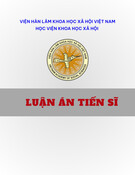




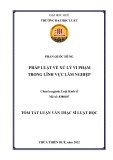

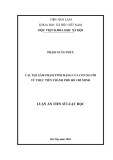
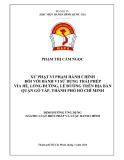
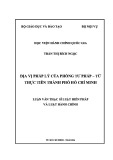
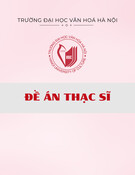


![Đề án Thạc sĩ: Tổ chức hoạt động văn hóa cho sinh viên Trường Cao đẳng Du lịch Hà Nội [Chuẩn nhất]](https://cdn.tailieu.vn/images/document/thumbnail/2025/20251202/kimphuong1001/135x160/91661764646353.jpg)
